|
|
|
Sort Order |
|
|
|
Items / Page
|
|
|
|
|
|
|
| Srl | Item |
| 1 |
ID:
131332
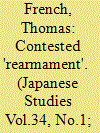

|
|
|
|
|
| Publication |
2014.
|
| Summary/Abstract |
This paper employs previously unused archival sources to highlight some of the misconceptions and debates which surround the Japanese National Police Reserve (1950-1952), the precursor to today's Ground Self Defense Force. The paper, which is the first on the National Police Reserve in English, examines much of the current historiography's categorisation of the Reserve as an army, based on a very thin set of sources, and contrasts this with the content of the primary sources in an attempt to reveal the true character of the force. In doing so it also attempts to assess the relative importance of the internal and external influences behind the NPR's creation. The article and its conclusions will be valuable in deepening the understanding of the character of the NPR and its position in the broader histories of the Occupation of Japan, Japanese security policy and Japan's Cold War(s).
|
|
|
|
|
|
|
|
|
|
|
|
|
|
|
|
| 2 |
ID:
031893
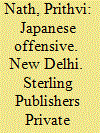

|
|
|
|
|
| Publication |
New Delhi, Sterling Publishers Private Limited, 1990.
|
| Description |
92p.Hbk
|
| Standard Number |
81-207-1234 X
|
|
|
|
|
|
|
|
|
|
|
|
Copies: C:1/I:0,R:0,Q:0
Circulation
| Accession# | Call# | Current Location | Status | Policy | Location |
| 032630 | 940.541352/NAT 032630 | Main | On Shelf | General | |
|
|
|
|
| 3 |
ID:
144480
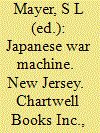

|
|
|
|
|
| Publication |
New Jersey, Chartwell Books Inc., 1976.
|
| Description |
255p.: ill.hbk
|
| Standard Number |
0890090815
|
|
|
|
|
|
|
|
|
|
|
|
Copies: C:1/I:0,R:0,Q:0
Circulation
| Accession# | Call# | Current Location | Status | Policy | Location |
| 019049 | 940.541342/MAY 019049 | Main | On Shelf | General | |
|
|
|
|
| 4 |
ID:
130465
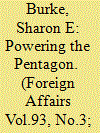

|
|
|
|
|
| Publication |
2014.
|
| Summary/Abstract |
The Defense Department is the United States' largest energy consumer, but it's also a major incubator of cutting-edge technologies. To cut fuel demands and meet new threats, the Pentagon is transforming the U.S. military from an organization that uses as much fuel as it can get to one that uses only as much as it needs.
In the immediate aftermath of World War II, the U.S. naval aviator Thomas Moorer questioned Takeo Kurita, a former vice admiral of the Imperial Japanese Navy, as part of the U.S. military's postwar interrogation of Japanese commanders. Kurita told Moorer that one of the most significant reversals of fortune Japan had suffered during the war was the loss of fuel supplies. "We ran out of oil," Kurita said, and by the end of the war, the Japanese military had grown so desperate, it was operating its equipment on fuel distilled from old tires, rice, and even pine needles. "What I learned then," Moorer would note years later, "was never lose a war, and the way to lose a war is to run out of oil."
|
|
|
|
|
|
|
|
|
|
|
|
|
|
|
|
| 5 |
ID:
088588
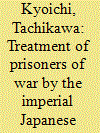

|
|
|
| 6 |
ID:
133083
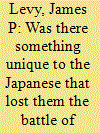

|
|
|
|
|
| Publication |
2014.
|
| Summary/Abstract |
We military historians have a tendency to obsess over the causes of victory and defeat in war. Like economists, we have a profound desire to identify those actions that ensure success or generate failure, and like economists we are not overly good at it. At best, we can state the obvious, as when the disparity of forces between two opponents is extreme, or ascertain certain verities, like "It is good to have the better trained troops," or "Keep your troops better equipped, fed, and rested than your opponent's." At worst, this obsession with winning and losing can lead to a lot of shameless Monday-morning quarterbacking and counterfactual historical speculation.
|
|
|
|
|
|
|
|
|
|
|
|
|
|
|
|
|
|
|
|
|